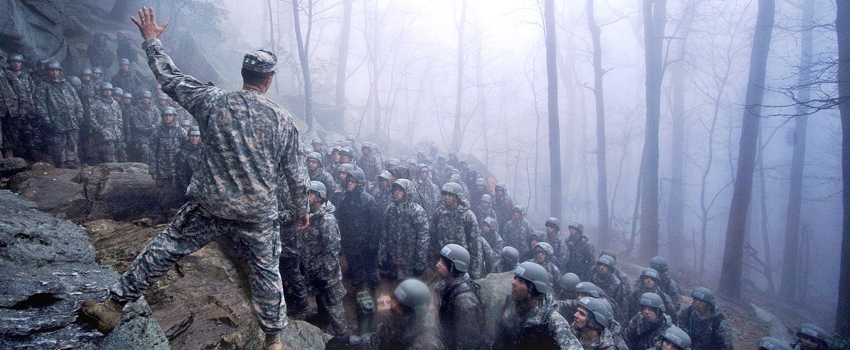
We’ve all said it once in our lives, right? Maybe not publicly, but we’ve certainly thought this to ourselves at some point in our adult life. When we do verbalize it, we say this when we encounter something that is blatantly wrong. It’s when something grabs your attention that is so poorly thought out, yet it still exists, it cocks your head to the side. We’re not so shocked at how perverse the act is, but more so that we didn’t really focus enough to see it before, as “a WTF” has probably been around for a while…we just never noticed it before. Even if we saw it, we didn’t let it sink in long enough to see how wrong it truly is. What hurts us most about a WTF is the emotional state that explodes inside us that can only be described as shame.
Well, I said it this past weekend, as I was having a conversation with a World War II veteran. We were discussing post 9-11 combat operations in Iraq and Afghanistan and he had asked primarily about why the suicide rate was so high. He said, “we saw all kinds of bad stuff, but we didn’t kill ourselves.” I reminded him that post World War II statistics showed an alarming rise in domestic abuse, alcoholism, and homelessness. It didn’t register, as he was focused on understanding why someone would take their own life. I saw this as a challenge, and waded in to make my best case and to teach this old timer something new. Little did I realize, I was about to learn something.
As I prepared my response to him I wanted to highlight what I thought, were the many factors that make this current conflict unique in our country’s history and why we can’t compare it to conflicts of the past. The first 5 factors (as I outline below) rolled off my tongue like a well timed .50 cal. Here they are:
1.Fewer Americans have participated in this conflict, as a percentage of the total US population, than ever before. The fact that over 75% of Americans are unfit to serve in the military, speaks volumes for the overall decline in our society's ability to handle physical demand and stress.
2. This is the longest conflict we have ever been involved with (as a nation) and more of our brothers and sisters have completed multiple tours of duty.
3.From a combat casualty perspective, we are surviving at exponentially higher rates. Battlefield survivability has risen  dramatically in this conflict, compared to others, due to MEDEVAC procedures and advance life saving techniques (i.e. Quik clot, etc).
dramatically in this conflict, compared to others, due to MEDEVAC procedures and advance life saving techniques (i.e. Quik clot, etc).
4.Rules of engagement have never been more complicated and evolving in any other conflict we have been involved in.
5.We are more connected than ever before. Combat soldiers can come back "inside the wire" and within the hour, connect with loved ones back home. Many times this involves sharing the stresses of the family and the hardships of missing children/paying bills. Bottom line: it's another layer of stress that has never existed before.
My WWII conversation-buddy shook his head and marveled at what was happening. He began to realize that the world was different and that more of his buddies died, rather than surviving with the scars of war that change us. I felt I was making progress, so I became even more deliberate in my approach.
The next 2 factors came a little slower, mainly due to the level of detail we discussed and because I have written about them extensively here on The Warrior Nation: SITREP. See if you recall these points:
6.The weapon of choice of our enemy, the IED, is producing more injuries than we are reporting. Only in the last few years are we beginning to get a handle on the magnitude of traumatic brain injury that is present in our fighting force. In the past, direct fire injuries were easy to see and allowed our medical teams the opportunity to treat these seen wounds. As the saying goes "no blood, no foul," so goes the health of our combat effected soldiers and Marines.
7.This is the first conflict that we have EVER studied the effects of combat on our fighting forces while the war is currently going on. All longitudinal studies conducted on PTSD / mental health, in the military, have been conducted after the end of combat operations. The fact that we share these headlines is proof to the novelty of understanding the long-term effects of sustained combat ops.
Taken together, these factors make it easy to see that our combat troops are being asked to do more than any generation in history, against an enemy that has never been so elusive, for longer periods of time.
So my WW II vet then says, “I am beginning to understand why so many are committing suicide. Seems like we could do more to help them.”
That brought me to point number 8:
 8. This is the first time that combat troops have been prescribed psychoactive medication, WHILE IN THEATER.
8. This is the first time that combat troops have been prescribed psychoactive medication, WHILE IN THEATER.
At this point, my WWII vet looked at me and asked, “is this common?”
I started to answer…but then it hit me.
I paused.
Then I answered him,
“No, it’s not…but it is the one factor all military suicide victims have in common.
We both sat there in silence for at least the next 20 minutes.
WTF?
